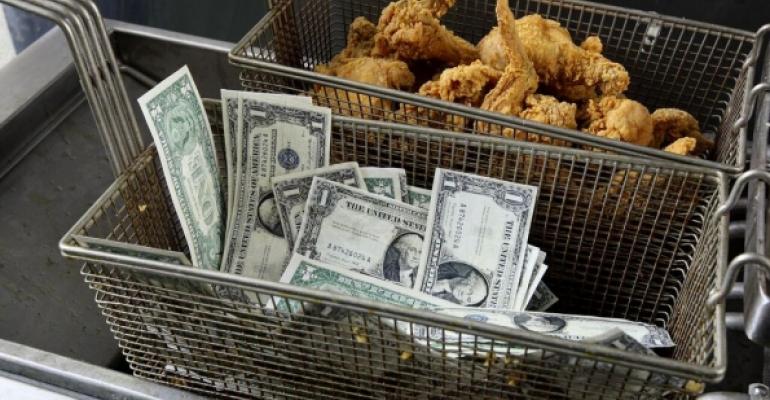The fryer is not just the center of flavor and crispiness in many professional kitchens. It is also the place where operators can start to solve the problems of safety and rising labor costs.
Used cooking oil is not only unsightly, odorous and attractive to pests, but it also is one more expense for operators who are facing the challenge of rising labor costs. Operators know they must dispose of fryer oil in a way that does not clog drains, make a mess inside or outside the restaurant, or cause harm to employees. And assigning the task to an hourly worker can cause more problems than it solves.
“The accepted way to dispose of waste oil in the fryer is to drain the hot oil into a container, take it out to the back of the restaurant and pour it into a waste oil bin,” says Jason Sayers, CEO of The Filta Group, Inc., a 20-year-old fryer management service, with national coverage, based in Orlando, Florida. “But then pests and water get into it, and there is spillage, and some cities are banning outdoor receptacles for oil altogether.”
A more important issue, Sayers says, is that labor costs are rising, and disposing of oil, let alone cleaning the fryers, is a task that can take several hours or more per week. That means one worker is frittering away time disposing of oil when they could be doing something more valuable for the kitchen. That is an important expenditure as the minimum wage rises in some markets. Several states and cities have passed legislation to raise the minimum wage. The minimum wage in Massachusetts is currently $10 per hour, while in California and New York a staggered increase will reach $15 an hour. In Washington the minimum wage remains at $9.47 per hour, but Seattle has a staggered increase which will reach $15.
According to the National Restaurant Association’s Restaurant Industry 2016, Forecast labor costs are top of mind for most operators. The report notes that approximately three quarters of restaurant operators say they expect labor costs to continue to be a challenge this year. Also according to the report about a third of sales in a typical restaurant goes toward labor costs.
Of course, most workers do not think about labor costs. They just do not want to handle the messy task of disposing of oil, a job that is usually assigned to entry-level workers. “It is harder to retain staff now,” Sayers says. “If they don’t like what they’re doing, they will move on quickly. And most don’t like dealing with the hot waste oil and cleaning the fryers”
Handling fryer oil also can be dangerous. No one wants workers to be injured, and restaurant operators are at risk of being charged higher workers’ compensation premiums due to claims from burns, slips on greasy floors, lifting heavy buckets of oil and other injuries.
One solution is to outsource fryer management. Filta offers several services such as FiltaFry, which is a cooking oil filtration and fryer management service. FiltaFry provides an eco-friendly, mobile onsite service that includes temperature calibration, cooking oil filtration and a thorough cleaning of each fryer. Then, when the oil is it at the end of its life, the Filta technician takes the oil straight off site, alleviating the need for any waste oil bins outside of the restaurant.
It is a valuable service that offers much more than waste oil disposal. “What we do is risk mitigation,” says Rob Totten, development director for Filta. “[Operators] no longer have to train employees on fryer management. Our professionally trained technicians perform their job carrying the highest insurance protection, latest technology, and mandatory personal protective equipment (PPE), so our clients are covered."
Totten acknowledges that sometimes it is not easy to get operators to adapt to the mindset of allowing a third party to perform a kitchen task. “One of the most common objections with independents is: 'We have always done it ourselves.'” So our job is to show them a better way of doing things,” Totten adds, so that eventually they come around to seeing another benefit with labor and retention, which is improved employee morale.
Outsourcing certain kitchen tasks makes sense in the current environment, says Ed Doyle, president of RealFood Consulting in Boston. Restaurant owners have long outsourced services such as deep cleaning and delivery. Some are outsourcing butchering, call centers and even preparing large batches of some foods offsite.
“Look to opportunities within your organizations for streamlining operations and reducing costs,” Doyle says. “But it only makes sense to reduce cost if you can maintain or improve the product you are putting out. At the end of the day the customer is getting a better product.”
By outsourcing an arduous or dangerous task, operators can instead spend that money on someone who can, for example, cook a signature dish or prep a high-profit menu item. “If I have to choose between saving a dollar in labor over a dollar in food costs, I will choose labor every time,” Doyle says. “You are surgically removing tasks, 15 minutes here, a half hour there, and improving productivity.”
The key is to utilize the staff for tasks at which they excel. “Let your staff focus on stuff no one else can do, such as seasoning the steak. If I am cleaning out the fryer, I may not pay attention to that steak,” Doyle says.




